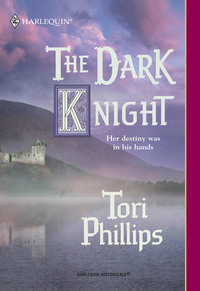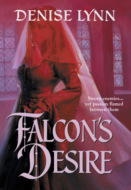Читать книгу: «The Dark Knight»
His eyes widened when he saw her and the naked blade she held.
“Missed me?” he asked with a half smile. His gaze searched hers for the answer.
Her knife clattered to the floor; its blade rang against the stones. With a cry of “Sandor!” Tonia threw herself against him. The bulk of his body and the warmth that emanated from him soothed her fears.
Time stood still.
He did not speak, but his hand slid down her spine, exploring each hollow of her back. His touch was oddly soft and caressing. A delicious shudder heated her body. Tonia knew that she should fight against her growing desire to move closer to him. A lifetime of prudence counseled her to resist. It was not too late to turn away and put him back in his place. She was a chaste virgin dedicated to God; he was a wild, unpredictable Gypsy….
The Dark Knight
Harlequin Historical #612
Praise for Tori Phillips’s previous titles
One Knight in Venice
“…filled with intrigue, excitement, romance and imaginative characters. Truly superb!”
—Affaire de Coeur
Lady of the Knight
“Ms. Phillips weaves an adventurous story…a good, fast-paced read.”
—Romantic Times
Three Dog Knight
“Readers will be held in thrall…a gem of a tale.”
—Romantic Times
Midsummer’s Knight
“…a fast paced plot…fully and funnily Shakespearean…wonderfully written…”
—Publishers Weekly (starred review)
#611 MY LADY’S PLEASURE
Julia Justiss
#613 THE COURTSHIP
Lynna Banning
#614 THE PERFECT WIFE
Mary Burton
The Dark Knight
Tori Phillips
MILLS & BOON
Before you start reading, why not sign up?
Thank you for downloading this Mills & Boon book. If you want to hear about exclusive discounts, special offers and competitions, sign up to our email newsletter today!
Or simply visit
Mills & Boon emails are completely free to receive and you can unsubscribe at any time via the link in any email we send you.
Available from Harlequin Historicals and
TORI PHILLIPS
Fool’s Paradise #307
*Silent Knight #343
*Midsummer’s Knight #415
*Three Dog Knight #438
*Lady of the Knight #476
*Halloween Knight #527
*One Knight in Venice #555
*The Dark Knight #612
To my great-nephew, Tyler Andrehsen, Dinosaur Trainer, Pirate Captain and Romance Hero-in-training!
Contents
Prologue
Chapter One
Chapter Two
Chapter Three
Chapter Four
Chapter Five
Chapter Six
Chapter Seven
Chapter Eight
Chapter Nine
Chapter Ten
Chapter Eleven
Chapter Twelve
Chapter Thirteen
Chapter Fourteen
Chapter Fifteen
Chapter Sixteen
Chapter Seventeen
Chapter Eighteen
Chapter Nineteen
Chapter Twenty
Chapter Twenty-One
Epilogue
Author Note
Prologue
“Have I not here the best cards for the game to coin this easy match?”
—Shakespeare’s King John
The Gypsy Encampment on
Hampstead Heath outside of London
April 1553
“Remember, Sandor, no blood is to be shed—not a drop when you kill the gadji.” Uncle Gheorghe paused while he coughed up more green phlegm.
Sandor Matskella looked down at his hands, hands that were expected to snuff out the life of an unknown Christian woman somewhere in the north of England. “I am a horse master,” he murmured. “What do I know of executions?” Now that he had learned the reason for his uncle’s urgent summons, Sandor wished he had been too far away to have answered.
Uncle Gheorghe made a wry face. “Bah! It is of no consequence what you know or do not know. You are young, strong—and healthy. That is all that is necessary. As you see, I am not able to rise from my bed. You will do the deed in my place as the crown’s executioner. You must—I have already spent the Constable’s gold.”
“And he took our Demeo,” snapped Aunt Mindra from her place by the fire. “That gadjo has thrown my boy into one of his deep pits in the Tower. He will hold Demeo among the rats to insure we keep our part of this contract.” She spat into the flames. “May the dogs eat the Constable’s heart and lick his blood.”
Sandor shuddered at his aunt’s curse. “What crime could a mere woman commit that the young English King requires her death?”
Uncle Gheorghe shrugged, then coughed up more phlegm. “Who knows? Who cares? It is enough that the death warrant is signed, sealed and delivered to me. Demeo is their hostage. The sooner you return from the north, the better it will be for him—and for all of us. Our people tread a slender rope here in England.”
“I want my son back before he is polluted by those Englishmen or he dies of a fever in that foul place,” Aunt Mindra snarled.
Sandor nodded, though he loathed the burden his uncle had placed on his shoulders. “I will leave within the hour,” he answered in a low tone. “Young Demeo has the heart of a bear. He will return to your fireside as good as he was when he was torn from it.” A little smile crossed Sandor’s lips when he thought of his wily cousin. “I expect he will return with a wealth of winnings from the pockets of the gadjo who have the misfortune to guard him.”
Uncle Gheorghe’s eyes, dull with fever, glared at him. “It is no laughing matter when the Constable himself delivers an order for an execution. Make haste to this Hawksnest Castle in the north. Kill the old woman and be done with it. But attend to every jot and tittle of the warrant. No witnesses—it is to be a secret execution. And no blood spilled. The Constable was very clear on that particular point.”
“Why?” Sandor furrowed his brow.
His uncle croaked a laugh. “It is a gadje whim, I expect. They employ the Rom to do their foul deeds for them so there will be no blood on their soft white hands. As to the woman, you can smother her but I think the garrote is better. You have the strong hands to do it properly.”
Sandor rubbed his palms together. What did he know of killing? He had butchered a chicken or a pig often enough, but never a human being. Certainly not a woman. “I will use the garrote,” he answered, hoping that his face did not betray the revulsion in his gut. “The quicker the better—for her.”
“Mayhap she will be wearing a gold chain,” Aunt Mindra mused. “Or pearl earrings. Bring me her jewelry to pay for my tears for my son.”
Her husband nodded. “Aye, that is your right, Sandor. As her executioner, you are allowed a few privileges.”
The sour taste of bile rose in Sandor’s throat. He would give his finest mare and her colt to be free of this onerous task, but his obligation to his mother’s brother overrode his reluctance. He balled his right hand into a fist. “I will take this woman’s life quickly, but I see no need to take her dignity as well.”
His aunt made a face. “The condemned is a gadji,” she said as if that one fact excused any wicked behavior on his part. “Since she is not a Rom, it does not matter what you do with her.”
Uncle Gheorghe held out the warrant, written on stiff parchment. The official seal glistened like blood in the firelight. “Take this and keep it with you. If any man stops you on your journey, you will show him this and tell him you are on the King’s business.”
“Let us hope that man can read,” muttered Sandor, who could not.
His uncle passed a small wooden box to him. A brass lock dangled from its clasp. “Once the woman is dead, cut out her heart, wrap it in cloth and lock it in this box together with a bit of her hair and a piece of her gown. That will be the proof that she is dead.”
Sandor curled his lip. “What vile mind conceived this idea?”
His uncle sneered. “Good Christian men who sleep sound in their beds at night. The Constable was most insistent upon this last point.”
“Demeo’s life requires it,” added Aunt Mindra.
Sandor took the box and pushed it deep in his canvas sack so that he wouldn’t have to look at the thing any more than necessary. “You must have been paid well for this pretty piece of work,” he dared to say out of the side of his mouth. When healthy, Uncle Gheorghe possessed a formidable temper.
“Not enough to insure my son’s life,” the older man growled. “Do your duty and be quick about it. The sooner you go, the sooner you return. So go!” He waved his nephew away from his bedside.
Before leaving the camp, Sandor paid a quick visit to his grandmother, the family’s venerated puridai. He did not want to begin such a troubling journey without having his fortune read. Old Towla Lalow was the wisest woman Sandor had ever known. She greeted him with a smile when he lifted the flap of her bender tent.
“I knew you would come, my son,” she said when he kissed her cheek.
He grinned at her. “Your cards told you this?”
She shook her head. “My heart,” she replied, tapping her breast. Then she took her special deck of tarocchi cards from a burgundy velvet bag. Though the thick vellum cards were very old, their gilding still gleamed in the lantern’s light. She shuffled her deck, then laid down the cards in a horseshoe pattern, while she sang to herself under her breath.
Sitting opposite her, Sandor waited patiently, despite his need for haste. Time with Towla was never wasted. When she had placed the spread of cards to her satisfaction, she studied them with deep concentration, adding lines to those the passing years had already etched on her face. The fire hissed in the charcoal brazier.
His grandmother pointed to the first card. “Here you are,” she said with fondness.
Sandor snorted. “Prosto, the Fool? Aye, for I go on a fool’s errand.”
Towla shook her head. “Nay, your journey will be a most important one for you.” Then she pointed to the second card. Two Lovers joined hands under a golden canopy.
Sandor only shook his head with a rueful grin. He was going north to kill, not to fall in love. However, he said nothing lest he insult his grandmother and her tarocchi.
Towla tapped the center card. Sandor sucked in his breath when he saw it was the grim figure of Death.
His grandmother chortled. “It is the card of great change. Does that frighten you, Sandor?”
He fidgeted. “Nothing frightens me except the devil.”
His grandmother only broadened her smile. “You are wise to be wary of change, my son, and yet, do not hide from it.”
He cleared his throat. “What do you see?”
“You will help others who would never help you,” she began.
He snorted. “That describes every gadjo I have ever trained a horse for.”
“You were born lucky in many things, but not in all,” she continued.
Sandor nodded. His parents had died in an outbreak of the sweating sickness when he was a child, yet he had survived unscathed. He had a gift for training horses, almost as if he knew their thoughts, yet now he was commanded to take up his uncle’s employment and become a killer. How was that lucky?
Towla touched the Hermit, the fourth card of the spread. “Your journey will be one inside of you as well as on the road. Use this time wisely to read your soul.”
“And the change that you speak of?” he asked, pointing to the card bearing the black figure holding a scythe.
“Ah!” Towla’s eyes twinkled in the firelight. She pointed to the Lovers. “You will have a friend who is an enemy. You will find life holding hands with death. And—” she tapped the Fool “—you will make a decision that will alter your path forever—if you dare to risk it.”
“Is the risk worth the effort?” he asked, discomforted by her predictions.
She swept up the cards into a neat pile before he had a chance to look at the fifth card in the spread—the one that foretold the outcome. “That is your decision to make, not mine,” she replied. “Come closer and let me kiss you, Sandor, for we never know when we kiss for the last time.”
“Grandmother, your talk is none too cheerful,” he said as he kissed her.
“Then smile for me,” she commanded. “Ah, your smile would beguile the very angels from their clouds.” She kissed him on each cheek. “Baxtalo drom! May your road be lucky.”
“And may I soon return to you,” he whispered. He started to rise, but she put her hand on his sleeve.
“Where does Gheorghe send you?”
He sighed. “To the mountains north of here, to a place called Hawksnest. It is a castle, I think.”
Towla considered his destination. “Sounds cold. Wrap up warmly. Take extra food—and a sheepskin. Methinks you will need them anon, for your journey will be longer than you expect. Whom do you execute for the boy King’s pleasure?”
Sandor cleared his throat. “It is a noblewoman, though why, I do not know.”
A tiny smile curled his grandmother’s lips. “And her name?”
“Lady Gastonia Cavendish.”
Chapter One
Hawksnest Castle in the Pennine Mountains
Tonia Cavendish huddled as close to the dying embers of her cell’s meager fire as she dared. The feeble heat barely warmed her fingers numbed by the icy wind whistling through the tiny arrow slit high in one wall, her only source of daylight. At home in Northumberland, her father would be overseeing the spring planting on the family’s estate. Did Sir Guy Cavendish have any inkling that his eldest daughter was not safely in the little house of prayer she had established near the Scottish border? Instead, Tonia shivered inside a dark prison, high in the mountains that ran like a bony spine down England’s length.
Was it a week ago that she had been brought to this ruined ancient fortress, or ten days? Time seemed to have stood still since the moment she and her band of pious young women had been torn from their prayers, taken by night to York, and tried for the crime of treason against the crown. Tonia would have considered the charges to be ludicrous except for the fact that her stern judges had sentenced her to death.
She had been given no chance to defend herself, or to call upon her family for aid. Within the hour of her sentencing, she had been driven through the streets of York, bound and gagged inside a dark coach. After a day and night of nonstop travel, she found herself here at the end of the earth. Her four guards, rough, swearing men, told her nothing, and they begrudged her the crusts of bread and sticks for her fire. If she was to die, why didn’t they just leave her to starve or freeze to death and be done with it? They said she must wait. So she spent her days and most of her nights in prayer—waiting and shivering.
At the end of the hall, beyond the stone-cold room that was her cell, the men kept a cheerful fire going in the guardroom. Tonia could smell the oak and hickory smoke and see the light of the high flames dance on the wall opposite the barred window in her door. Other savory smells taunted her: meat roasting on the spit and hot chestnuts popping on the hearth just out of sight of her little icy hell.
Tonia tried to forgive her captors as she knew she should, but sometimes the hunger that gnawed her empty stomach sent all her good Christian thoughts flying like the snowflakes that occasionally fluttered through her pathetic window. Huddling deeper in the woolen cloak that the guards had allowed her to keep, she prayed to her patron, Saint Michael, for deliverance.
Tonia shook herself awake; she had dozed off frequently during the past few days. She feared that if she slept, she would freeze to death. Outside, the pewter-gray sky had changed to a darker hue. Then she noticed that the voices in the guardroom spoke in louder and more animated tones. Flexing her aching joints, Tonia rose from her hearthside pallet and crept to the door. Pressing her cheek against the rough wood, she peered through the bars but could see nothing except the stone wall opposite, the turn of the corridor and dim shadows beyond. The voices told her that two, possibly three of her guards were conversing with someone new.
The stranger’s voice, deeper than the others and lower in tone, spoke with a foreign accent, though Tonia could not make out the words he said to the men. A sudden trembling overtook her. She remembered the story she had heard as a child that the late King Henry VIII had sent to France for a special headsman when he had executed his second wife, Anne Boleyn. Had Tonia’s own headsman finally arrived? She pressed her chapped knuckles against her lips to keep her fear from crying out. She would not give those louts at the end of the hall the pleasure of witnessing her distress.
The conversation ceased abruptly with a clatter and several bawdy jests. Then Tonia heard their footsteps recede. The silence that followed frightened her far more than the lewd suggestions and taunts her captors had thrown at her during her captivity. The suffocating stillness engulfed her. Her ears tingled with the strain to hear something—anything. The light of the guards’ fire that mocked her chilled body slowly burned down, leaving the end of the hall in near-darkness for the first time since her arrival.
While there was still a lone spark in her own hearth, Tonia picked her way across the uneven flag-stone floor to her pallet. “Good Saint Michael,” she prayed aloud, not caring if any unfriendly mortal also heard her, “send me your strength for I am very weak and sore afraid.”
The last ember winked out in a thin plume of curling smoke. Tonia pulled her cloak tighter around her. A new thought knifed through her. Suppose the guards had abandoned her! They may have received word to return from whence they came, and to leave Tonia to her fate in the bowels of this isolated mountain fastness. She choked back a sob. She must be strong to the end—and a bitter cold end it was likely to be.
It gave her little comfort to think that she would die a martyr for daring to open a Catholic nunnery within the boundaries of her Protestant homeland, currently racked with religious dissension in the name of the sickly young King Edward VI. Her father had warned her of her folly, but Tonia thought that by living so far from London, she and her followers would be safe from the stern laws against popery. And what of the others who had been arrested with Tonia? Had Lucy, Agatha, Margaret and little Nan suffered the same fate as she? Were their deaths on her soul? “Pray forgive me, sisters,” she whispered into the darkness.
A noise awoke Tonia with a start. Angry with herself for falling to sleep again in the middle of her prayers, she blamed the lack of food for making her light-headed. Again she heard the noise that had disturbed her slumber. Someone had returned to the guards’ room. She was not alone! A sudden gladness overwhelmed her before her common sense prevailed. Whomever was bustling around out there had not come to free her, or he would have done so immediately. This unseen person was either a new jailer, perhaps one skilled in torture—or her executioner.
Through the barred window she saw a light move toward her. Her stomach growled with a bleak anticipation of food. A man’s heavy tread echoed down the narrow corridor; his armament jingled as he walked. Then a dark form blotted out the light on the other side of the door.
Her heart nearly jumping out of her breast in fear, Tonia pulled herself erect. She would face this stranger on her feet rather than huddling on her knees. After all, she was a Cavendish, one of England’s greatest families. She would not dishonor the Cavendish’s sterling reputation for bravery—no matter what the next few moments might bring.
A key rattled in the door’s lock. Tonia’s teeth chattered. Clenching her jaw, she squared her shoulders. She would be bold, like the great wolf that was the Cavendish family emblem. Squealing in protest, the door swung open on its rusty hinges.
Tonia sucked in her breath.
The man in the doorway appeared huge. His dark cape covered his broad shoulders, making him look as if he had just furled two large black wings. He had to duck his head to enter her cell. When he lifted his lantern higher, a small cry welled up inside Tonia. The man wore a black hood over half his face—an executioner’s mask.
Even though her knees shook with terror and weakness from hunger, Tonia dropped a small curtsy before her fate.
“Good evening, my Lord of Death,” she said in a steady voice. “I have been expecting you.”
The man took a step toward her then stopped and lifted his lantern higher still. Behind the slits in his mask, Tonia saw a pair of dark blue eyes glitter in the candle’s light.
Now that the worst had happened, she felt almost giddy with relief. “Come in, sir, and close the door quickly behind you. I fear you are causing a draft, and I am chilled enough as it is.”
He stood still like a large shadow.
Tonia stepped more into the pool of light cast by the lantern. Giving him a smile, she hoped that her lips did not tremble. “I pray you, my lord, do not linger but close the door. My time grows shorter by the minute and I prefer not to freeze to death in the meanwhile.”
Giving Tonia the briefest of nods, the hooded man turned and shut the door as if he were a guest in her father’s house instead of a rough minion of the crown. Then he placed the lantern on the small plank table that constituted the cell’s main piece of furniture.
“You are Lady Gastonia Cavendish?” he asked in a low tone. Had the man not been a headsman, his voice could have belonged to a minstrel.
She inclined her head. “I am. And who, sir, are you?”
He shook his head, and half turned away from her. “My name is not important.”
Judging from the sound of his voice, Tonia deduced that the man was young, perhaps near to her own age of three-and-twenty. She smiled again. “You fear that I would curse you with my last breath if I knew your identity?” When he did not reply, she suspected that she had hit the core of truth. “Have no fear, Master Death. My last words will be for God alone, I assure you.”
The headsman strode to the fireplace and stared at the heap of cooling ashes on the hearth. “Why did they not give you more wood before they left?”
Taken aback by his question, Tonia shrugged. “Why should they waste fuel—or food—on one who will be dead by dawn?” She hid her hands in the folds of her cloak so that he would not see them trembling. She wasn’t sure how much longer she could keep up her veneer of courage.
He glanced at her over his shoulder. “You have not eaten?”
Tonia sank down on the only stool. “Not since last evening at this time. I fear that you arrived just before my midday meal.”
“’Tis no way to treat a lady,” he muttered, more to himself than to her.
Tonia detected a chivalry that she had not expected from so dire a visitor. “My jailers did not consider me a lady, but only a common criminal awaiting my appointment with death.” When he said nothing in response to this, she pushed her boldness a little further. “I pray you, sir, could you fetch me a cup of clean water before we proceed to more serious matters? My throat is parched. I would bless your name, if I knew it, for such a little kindness.”
He muttered something that sounded like an oath under his breath, but Tonia did not recognize the language. Then he turned on his heel. Without a word to her or a backward glance, he flung open the door, strode through it and banged it shut behind him. At least he had left his lantern. Tonia stretched out her fingers to its flickering heat while she wondered what would happen next.
Once he had rounded the corner of the hall, Sandor ripped off his hood and mopped his sweating face with his sleeve. Why hadn’t one of those gadje guards warned him that his intended victim was young and exceedingly beautiful, instead of the old crone he had expected? He pressed his burning forehead against the rough stone wall to cool his skin, though nothing could temper the flame that had ignited him the moment his lantern’s light had fallen upon Lady Gastonia.
Tall and slim like a willow in a summer meadow; her every movement like a dance. Bright blue eyes like precious sapphires set against the white silk of her skin. And her hair! Sandor groaned to himself. A man would be in paradise if he could lose himself within that raven cascade; her disheveled appearance from her captivity only made her more enticing. And what unexpected courage lodged in her heart! She had curtsied to him as if he were the finest lord of the land even though she had recognized him for what he was—the instrument of her death.
Sandor clenched his large hands. This beautiful gadji had been sent to tempt his soul. Pushing that thought, and more lusty ones, to the back of his mind, Sandor replaced the hood over his head. Then he lifted the water skin from the peg on the guardroom wall and threw its strap over his shoulder. Loading one arm with a stack of split logs and kindling, he swept up his travel pack and an abandoned cup with his free hand. Taking a deep breath for fortification, he returned to the lady’s cell. Before pushing open the door, he peered through the little window.
Lady Gastonia still sat on the stool, though she had drawn his lantern closer to her. Its golden glow lit up her face. Jaj! She was even more beautiful than he had first thought. What madness had possessed the ministers of the King to seek the death of such a flower as this one? He pushed open the door, causing her to look up at him. She smiled, not like a woman knowledgeable of the world, but like an innocent child—and yet no child had such lush lips so full of delightful promise. He kicked the door shut behind him.
Her finely arched brows drew up. “You come better provisioned than I had hoped, sir.”
Her voice was silver, rippling like the music of a lover’s lute. He swallowed the knot in his throat. “I have traveled three nights and four days in the saddle since London, my lady,” he said as he dumped the firewood on the hearth stone. “I am cold, tired and hungry.” Hungry for her, as well as the bread and cheese that he had in his sack.
She folded her hands in her lap. “I fear this place does not offer many comforts.”
You are here and that is a comfort. Sandor shook off this dangerous thought. The lady was marked for death, not life. He hunkered down before the fireplace and arranged the logs and brush. Then he thrust a twig into the lantern’s flame. When it ignited, he touched it to the dry kindling. Flames leapt at his command. Sandor was aware that the bewitching gadji moved her stool a little closer to the fire. He could feel the heat of her body behind him even through the fur-lined cloak that he wore.
“My grateful thanks to you, Monsieur de Mort,” she murmured. She lifted the skirts of her simple gray gown so that the fire could warm her feet and ankles.
Sandor dared to look at her again, though her beauty made his tongue stick to the roof of his mouth. “You speak French?” he blurted out.
“Oui,” she replied, then continued in that language. “My mother was born in the Loire Valley. From birth, my sisters and I learned both French and English.”
He wet his dry lips. “I was born in a field outside of Paris one winter’s morn when my family camped there for the season,” he replied in French.
Again she lifted her dainty brows, and her jewel eyes widened. “You were born in a tent?”
He chuckled. “Oui, and my first cradle was our wagon horse’s collar.”
“Then you were like the infant Jesu?” Her voice held wonderment.
He shook his head. “Non, we believe it is good luck for newborns to sleep in such a bed. Horses are our life. That is the way of the Rom.” He fed another log to the fire.
She half cocked her head, then asked in English, “Pray, what is a Rom? I am not familiar with that word in either language.”
Sandor lifted the water skin off his shoulder, uncorked it and poured some of its liquid into the chipped clay cup. Why should he be afraid to tell her? After all, he was here to kill her, wasn’t he? Her opinion, one way or the other, was of no importance to him. She was only a gadji.
He handed the cup to her. “The Rom are my people,” he said as she gulped down the water. “That is what we call ourselves.” He poured more into her cup. “You…that is…Christians have called us many different names, some of them are not fit for a lady’s ears.” He took a deep breath. Why was his heart beating so fast? “The French thought that we came over the sea from Egypt because our skin is darker, our hair is black and we speak in a strange tongue.”
“Egypt!” The lady’s eyes shone. “A friend of my family’s is a merchant who travels over the Mediterranean Sea. Jobe has often told us wondrous tales of that ancient country. How I have longed to go there! Tell me, are there truly beasts that have large mouths full of fearsome teeth and scales so thick that arrows bounce off them?”
Sandor could not help but smile at her enthusiasm. He shrugged. “I do not know, my lady. I have never been to Egypt. Nor has any member of my clan, yet we are called Egyptians. But here in England, the Rom are known as Gypsies.”
The lady regarded him over the cup’s rim. “You are a Gypsy, then?”
He nodded, watching for her reaction. She surprised him by smiling.
“I have never met a Gypsy before, but I have heard of your people.”
“No doubt,” Sandor muttered. He could well imagine what good gadje parents would tell their delectable daughters about the evil Gypsies.
“When I was little, my mother taught me a poem—a silly little rhyme.” She put the half-empty cup on the table, and then recited, “‘If you enjoy having futures foretold,/Watch out for your pennies, your silver and gold.”’
Начислим
+14
Покупайте книги и получайте бонусы в Литрес, Читай-городе и Буквоеде.
Участвовать в бонусной программе









